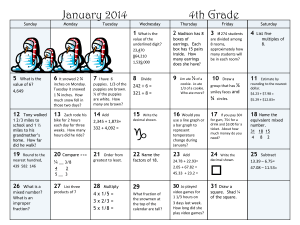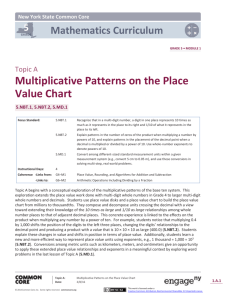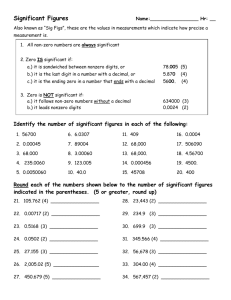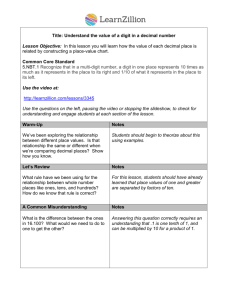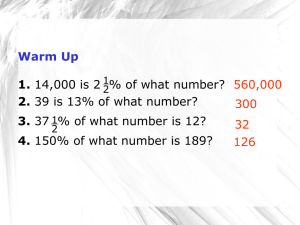Open Ended Questions
advertisement
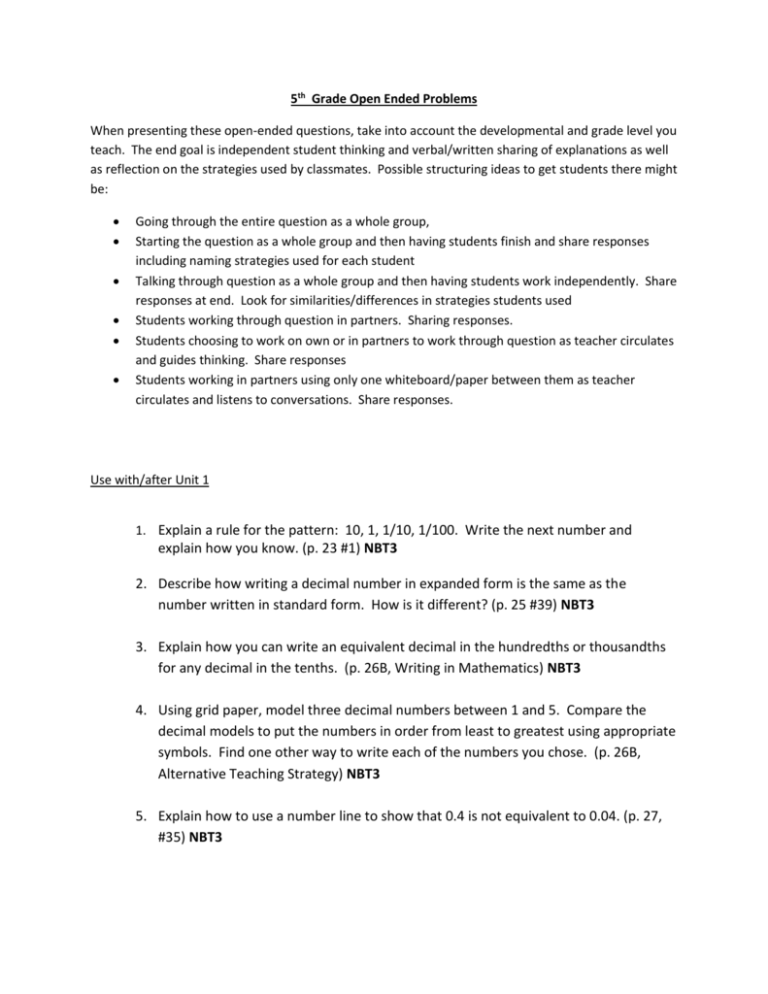
5th Grade Open Ended Problems When presenting these open-ended questions, take into account the developmental and grade level you teach. The end goal is independent student thinking and verbal/written sharing of explanations as well as reflection on the strategies used by classmates. Possible structuring ideas to get students there might be: Going through the entire question as a whole group, Starting the question as a whole group and then having students finish and share responses including naming strategies used for each student Talking through question as a whole group and then having students work independently. Share responses at end. Look for similarities/differences in strategies students used Students working through question in partners. Sharing responses. Students choosing to work on own or in partners to work through question as teacher circulates and guides thinking. Share responses Students working in partners using only one whiteboard/paper between them as teacher circulates and listens to conversations. Share responses. Use with/after Unit 1 1. Explain a rule for the pattern: 10, 1, 1/10, 1/100. Write the next number and explain how you know. (p. 23 #1) NBT3 2. Describe how writing a decimal number in expanded form is the same as the number written in standard form. How is it different? (p. 25 #39) NBT3 3. Explain how you can write an equivalent decimal in the hundredths or thousandths for any decimal in the tenths. (p. 26B, Writing in Mathematics) NBT3 4. Using grid paper, model three decimal numbers between 1 and 5. Compare the decimal models to put the numbers in order from least to greatest using appropriate symbols. Find one other way to write each of the numbers you chose. (p. 26B, Alternative Teaching Strategy) NBT3 5. Explain how to use a number line to show that 0.4 is not equivalent to 0.04. (p. 27, #35) NBT3 6. Is a number with three digits to the right of the decimal point always greater than a number with two digits to the right of the decimal point? Explain your reasoning (p. 48, side bar) NBT3 7. Finish this sentence: Round means to…. (p. 41, #41) NBT4 8. Jerome’s father spent $41.62 at the grocery store, $16.59 at the pharmacy, and $21.17 at the hardware store. Jerome estimated how much he spent. Explain for each answers of these why it would or would not be a good estimate. a. $70 b. $80 c. $90 d. $100 (p. 49, problem solving worksheet 3.5, #7) NBT4 9. Without adding, how do you know that the sum of 36.179 and 8.63 will have a 9 in the thousandths place? (p.50, #42)NBT7 10. Choose manipulatives to model and solve. Steve spent $9.45 on a ticket to the game and $3.75 for snacks. He had $7.35 left at the end of the day. How much did he have at the beginning of the day? Explain your reasoning. (p. 51, #44) NBT7 11. Explain why 6 is an unreasonable value for n in this expression: Lyle has some fish. He buys 3 more fish and then sells 10 fish. Expression: (n + 3) – 10. (p. 65, #1) OA2 12. Write an expression to describe each scenario and explain why your expressions works. Is there another way to express that scenario mathematically? a. Sam had 10 dimes. He gave Gary 4. b. Kim had 24 cookies, ate 6, and then baked 12 more. c. Rona had 96 pencils and then sold some (p. 65, #s 2, 4, 5) OA2 Use with/after Unit 3 13. A tiled classroom floor measures 32 feet by 26 feet. What is the area of the classroom floor in square feet? Justify your answer. (p. 153, problem solving worksheet 7.3, #3) NBT5 14. A large auditorium has 1,600 seats. What are possible arrangements for the seats in rows? (p.155, problem solving worksheet 7.4, #3) NBT5 15. Using play money, demonstrate 5 different ways to make $0.57. Explain your groupings using words and numeric expressions. (p. 164B, Alternative Teaching Strategy) NBT7 16. Draw a model to describe and explain your thinking. The red kangaroo, the world’s largest marsupial, uses its tail for balance when jumping. Its tail is about 0.53 times as long as its body. Its body is about 2 meters long. How long is its tail? (p.164, Explore Question) NBT7 Use with/after Unit 4 17. Write three different division expressions to describe this array. Explain how you know. (not in Harcourt), NBT6 18. Create a model (manipulatives or drawing) to describe the relationship between 7, 70, 700 and 0.70. Describe your model in words. (not in Harcourt) NBT 1 19. Using play money, model the number of dimes that equal 1.5 dollars. Ask students to separate the dimes into equal groups. What are the possible combinations? Express your combinations with numbers and words. (p.230B, Alternative Teaching Strategy) NBT7 20. You have 8.4 cm of string. Show at least two different ways your string can be divided equally. Explain your thinking in numbers and words. (p.232B, Alternative Teaching Strategy). NBT7 21. Jenny ran 6/25 mile. Greg ran 0.21 mile. Who ran farther? Explain how you know. (p.239, #23) NF3 22. Matt ate ¼ of a pizza and Mike ate 2/5 of a pizza. Explain how to change each fraction into an equivalent decimal to determine who ate more. (p.239, Assess Sidebar) NF3 23. Write an expression to describe this question: The ball park sold 12,486 hot dogs during the 3 hour baseball game. They sold the same amount each hour. Explain how why your expression works. (p.247, Problem Solving Worksheet 12.1) OA2 24. Selena and Betsy evaluated 7 + 3 x 4 +3 +19. Selena said the answer is 41. Betsy said the answer is 62. Who made the error and what is it? (P. 271 #5) OA1 25. Write a problem about a pattern that has the ordered pair (2, 20) as the second values to x and y. Write out the ordered pairs for all of your x and y values. Explain the rule you used. X 2 y 20 (p.253, #21) OA3 Use with/after Unit 5 26. By 2002, more than 5.8 x 108 people around the world were using the Internet. Explain how you can write 5.8 x 108 in standard form. What is the relationship between 5.8 and 5.8 x 108? (p.337 Challenge Stretch Your Thinking) NBT2 27. Describe two ways you can change a decimal to a fraction and two ways you can change a fraction to a decimal. (p.329, #1) NF3 28. Harvey says 1/4 is equivalent to 0.4 because they both have a 4. Explain and correct the error. ( p330, #43) NF3 Use with/after Unit 6 29. Sara and Matt each ordered a medium pizza. Sara ate 3/8 of her pizza for lunch and 2/8 for a snack. Matt ate 2/4 of his pizza for lunch and 1/4 for a snack. Who ate more pizza? Explain using numbers, pictures, and words. (p.347, #21) NF2 30. John has to mix 1/2 cup of flour and 1/4 cup of sugar. He has a container that hold 7/8 cup. Can John mix the flour and sugar in the container? Explain your reasoning. (p351, #37) NF2 31. Explain how you can estimate the sum of 4/5 and 1/10. (p352, #28) NF2 32. Dan wrote a report. He found 1/8 of the information for the report on the Internet and 1/2 at the library. How much of his information did he get from sources other than the Internet and the library? Justify your thinking. (p.354, #33) NF2 33. Explain two possible answers to this question. The red line is 3/16 inch longer than the green line but 3/8 inch shorter than the blue line. The green line is 9/16 inch shorter than the blue line. How long is each line? (p360A, Problem of the Day) NF2 34. Larry had 4 1/2 quarts of apple cider. He used 3 4/5 quarts for punch. Larry says that he has 1 3/10 quarts left. Describe his error and write the correct amount. (p.375, #9) NF1 35. What if Jessica's tower was 11/12 yard tall after 3 weeks? This was 1/6 yard taller than it was after 2 weeks. The height at 2 weeks was 1/4 yard taller than it was after the first week. How tall was the tower after the first week? Explain your thinking using numbers, pictures, and words. (p.361, #1) NF2 36. Mrs. Kelly is making matching outfits. She needs 4 1/2 yards for her dress and 3 yards for her daughter's dress. If she buys 8 yards of fabric will she have enough to make a matching doll dress that requires 1/2 yard of fabric? Explain your answer. (p.377, #22) NF2 37. Design a garden in the shape of a rectangle. Plan the number of rows it will have as well as the types of flowers or vegetables you will plant. Write at least 2 number sentences to describe what part of the garden was planted with each item. (p.386B Advanced Learners) NF4 38. Nel ate 1/3 of 1/2 of the pizza. Sue ate 1/2 of 1/4 of the pizza. Who ate more? Explain your reasoning using numbers, pictures, and words. (p. 387, #28) NF6 39. Of the 50 students in the school band, 2/5 play woodwind instrument. In the woodwind section, 1/2 of the students play the clarinet. How many students play the clarinet. Explain your strategy for solving. (p.387, #27) NF6 40. Don is making 4 batches of fig bars and 3 batches of date bars. He needs 2/3 cup sugar for each batch. How much sugar will he need. Find and explain 2 different solution paths to solve this question. (p.389, #31) NF4 41. Write a problem about finding a fractional part of 3 1/2 dozen apples. Solve the problems and explain your thinking. (p.391, #34) NF6 42. Mrs. Jones teaches in a room that is 60 feet wide and 40 feet long. Mr. Thomas teaches in a room that is half as wide, but has the same length. How do the dimensions and area of Mr. Thomas’ classroom compare to Mrs. Jones’ room? Draw a picture to prove your answer. (http://coedpages.uncc.edu/abpolly/math/core/unpacking/unpacked-5th.pdf) NF5 43. Mrs. Bennett is planting two flower beds. The first flower bed is 5 meters long and 6/5 meters wide. The second flower bed is 5 meters long and 5/6 meters wide. How do the areas of these two flower beds compare? Is the value of the area larger or smaller than 5 square meters? Draw pictures to prove your answer. (http://coedpages.uncc.edu/abpolly/math/core/unpacking/unpacked-5th.pdf) NF5 44. If you divide 1/10 of a dollar into parts that are each 1/100 of a dollar, how many parts are there? What are they called? Explain your thinking. (p.403, #13) NF7 45. What if a tortoise travels 2/12 miles per hour? How many hours will it take the tortoise to walk 6 miles? (p.407, #30) NF7 46. Write a problem that has a whole number divided by a fraction, with a quotient of 4. (p.407, #31) NF7 Use with/after Unit 7 47. Use the chart that represents the number of fish that Sam and Terri catch. Describe the pattern. Plot the points on a coordinate plane and make a line graph. Interpret the graph OA3 Days 0 1 2 3 4 5 Sam’s Total Number of Fish 0 2 4 6 8 10 Terri’s Total Number of Fish 0 4 8 12 16 20 48. Explain which type of graph would be the most appropriate to compare the high temperatures for a week. (p.107, #1) CRT testing 49. Create a seating chart by drawing 16 student desks in a 4 x 4 grid. Name where each person sits by using an ordered pair of column and row. For example, column 1, row 2 (1,2). (p.120B, Alternative Teaching Strategy) G1 50. During which month is the temperature difference between the two cities the least? Explain your answer and describe how having the data displayed using a double-line graph is helpful in answering this question. (p123, #3) CRT test Temperature (oF) New York City and Miami Beach Monthly Normal Temperatures 90 80 70 60 50 40 30 20 10 0 New York City Month 51. Choose the best type of graph or plot to display the number of students in four schools. Explain your choice and then create a graph with your own data. (p.131, #3) CRT test 52. Classify each figure in as many ways as possible. (Suggestions of vocabulary are: quadrilateral, parallelogram, square, rectangle, rhombus, trapezoid) (P. 461 Teacher’s sidebar Lesson Quiz Transparency 21.2) 5.G.3 53. Triangle Hierarchy Diagram Materials: Triangles Sheet, Glue, Rulers Create a Hierarchy Diagram using the following terms: Polygons, Triangles, Equilateral Triangle, Scalene Triangle, Isosceles Triangle Measure and label the length of the sides of each triangle. Cut out the triangles and paste them in the appropriate place on the diagram. Explain your reasoning using mathematical language. http://www.k-5mathteachingresources.com/support-files/trianglehierarchydiagram1.pdf (For the triangle worksheet to make the diagram) http://www.k-5mathteachingresources.com/geometry-activities-2.html Has three other hierarchy diagrams for students to make. 5.G.4 54. Have students write directions, using ordered pairs, for graphing the first letter in their name on a coordinate plane. Switch with a partner and have students use a separate coordinate grid to graph their letter. (P. 500B Writing in Mathematics) 5.G.1 55. Using a coordinate grid in the 1st quadrant, students find the location of the park. (Could use a full coordinate grid with all 4 quadrants like the one on the left.) The park and the library have the same x-coordinate. The library is 1 unit left and 4 units up from the post office. The y-coordinate of the school is 3 more than the park’s y-coordinate. Where is the park? (P. 507 #1. Modified to be in quadrant 1 only.) (P. 516 Performance Assessment Task B is an alternate open-ended question.) 5.G.2 Use with/after Unit 8 56. Grace has 13 feet of fabric. Her pattern calls for 4 ½ yards of fabric. Does she have enough? Explain. (P. 530 #57 MD1 57. A baker had 10 sacks containing the following amounts of flour: 4 ½ lb, 3 ¼ lb, 2 ½ lb, 2 ½ lb, 4lb, 3 ¼ lb, 4 ¼ lb, 5lb, 2 ½ lb, 3 ¼ lb Plot the measurements on a line plot. Give the line plot a title and label the axis. If the baker redistributed the flour equally among the ten bags, how much flour would be in each bag? Explain your thinking. (From http://www.k5mathteachingresources.com/support-files/sacksofflour.pdf ) MD2 58. Explain in pictures, numbers, and words two different ways to find the volume of a rectangular prism. (P. 595 Teacher Sidebar Asses #1) MD3 59. Alan bought two small refrigerators. What is the difference in volume between what he purchased and the large refrigerator? *Small = 19 in x 18 in x 20 in. large = 19 in. x 18 in, x ? v = 11, 286 in3 ? (P. 594 #20, see picture to the right of the question) MD4 60. Compare a cubic inch to a cubic centimeter. Write down observations. (Discuss with students that a cubic inch is greater) using this thinking, the dimensions of a marble box are 4 ½ in. x 3 in. x 2 in. Is the volume of the box greater or less than 27cm 3? (P. 595 Problem Solving Thinker’s Corner) *Note: one dimension was changed on purpose so step #2 could be added to the open-ended question) Explain the advantages of using a formula to find volume rather than use cm or in. cubes. (P. 595 Teacher’s Sidebar Assess #2) MD5 Use with/after Unit 9 61. Part A Using the map on page 623, find 9-11 AND Describe the steps for using a map to find actual distance. (P. 623 #’s 9-11 and Teacher’s sidebar Assess #2) NF5 You may also choose to use distances on a map of Montana or that of reservations in Montana. Part B (See #2 under 5.NF.4) 62. Kira made a long-distance phone call to her grandmother. The first 10 minutes cost $2.00, and each minute after that cost $1.00 per minute. Make a chart for the data up to 15 minutes. Using the table, graph ordered pairs on a coordinate grid. Make an observation about the graph. (P. 253 #23. Modified to fit the Common Core standard) OA3 63. Which two butterflies are the same widths when each width is rounded to the nearest hundredth of an inch? (See diagram on page 41) (P. 41 #39) NBT4 64. If 9 people want to share a 50 pound sack of rice by weight, how many pounds of rice should each person get? Between what two whole numbers does the answer lie? (Common Core standard Example for NF.3) Additional Open-Ended Questions by Domain: Numbers in Base ten 5.NBT.1 Use at the end of unit 4 Tina says the quotient of 200,000/40 has four zeros. Describe Tina’s error and find the correct quotient. (P. 209 #29) 5.NBT.2 Use after lesson 8.2 Using pictures, numbers, and words, describe the pattern in the products when you multiply a decimal number by 10, by 100, and by 1,000. (P. 167 Teacher’s sidebar Assess #1) 5.NBT.3 Use after Unit 1 Lisa had $5.00 in her wallet. What different combinations of food items can she buy? (See menu on page 29) (P. 29 #23) 5.NBT.5 Use after Unit 3 before testing At the Stadium Problem (This question is the performance assessment on the Unit 3 test. Selecting different numbers to substitute in the problem is good practice and a great open-ended question.) (P. 186 Task A) 5.NBT.6 Use after Chapter 10 Create a word problem that could be solved by dividing a three digit dividend by a two digit divisor. Estimate the answer to your problem. Explain your strategy. Solve your problem. Show all your work. Use a different method of solving your problem to check that your answer is accurate. Explain your strategy. (From http://www.k-5mathteachingresources.com/supportfiles/creatingandsolvingadivisionproblem5nbt6.pdf ) What is the least 4-digit number that can be divided by 20 and have a remainder of 5? (P. 219 #33) 5.NBT.7 Use after Unit 4 before testing IEFA lesson on Area of Reservations Performance Assessment (Task A P. 90) Fractions 5.NF.1 and 5.NF.2 Use during Chapter 17 A turnover recipe calls for ¾ cup of biscuit mix and ½ cup of whole wheat flour. If Kevin doubles the recipe, what is the total number of cups of biscuit mix and flour he will need? (P. 371 #41.) Jake and Libby both made streamers for the nose cones of their model rockets from the same piece of ribbon. Jake said he used 3/8 of the ribbon, and Libby said she used ¾ of the ribbon. Was this possible? Show your work in pictures, numbers, and words. (p. 358 # 45) Edward says that if you add 2/3 and ¾, the sum will be greater than 1. Is he correct? Explain. (P. 359 # 53) 5.NF.4 Will the product of a fraction less than one and a whole number be less than or greater than the whole number? Use an example to explain your reasoning. You may also draw a picture to justify. (P. 389 #32) 5.NF.6 Use after Unit 6 (P. 418 It’s in the Bag: Create a Meal Cookbook) 5.NF.7 Use after Chapter 19 Part A: If a tortoise travels 2/12 miles per hour, how many hours will it take the tortoise to walk 6 miles? (P. 407 #30) Part B: Show a variety of ways to find 3 divided by 1/6. (P. 407 #1) Part C: How much chocolate will each person get if 3 people share a half-pound of chocolate equally? How many 1/3 cup servings are in 2 cups of raisins? (Common Core NF.7 examples.) Operations and Algebra 5.OA.1 Use after lesson 12.2 Selena and Betsy evaluated 7 + 3 x 4 +3 +19. Selena said the answer is 41. Betsy said the answer is 62. Who made the error and what is it? (P. 271 #5) 5.OA.2 Use at the end of Unit 4 If Uma saves $8.00 per week for n weeks, how long will she have to save before she can buy the scooter? Write an equation using the variable. (P. 270 Performance assessment Task B part b. Use the table given but modify the question. This question is the PA task for the unit 4 test.) Standard OA1 OA2 OA3 NBT1 NBT2 NBT3 NBT4 NBT5 NBT6 NBT7 NF1 NF2 NF3 NF4 NF5 NF6 NF7 MD1 MD2 MD3 MD4 MD5 G1 G2 G3 G4 Number of Questions Provided 2 4 3 2 2 9 3 2 3 7 2 7 4 3 2 4 4 1 1 1 1 1 2 1 1 1
